英语翻译(汉译英)1
- 格式:doc
- 大小:31.50 KB
- 文档页数:3
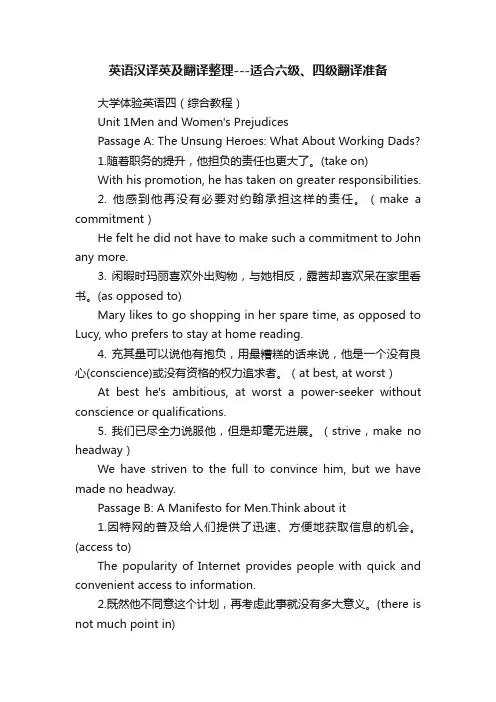
英语汉译英及翻译整理---适合六级、四级翻译准备大学体验英语四(综合教程)Unit 1Men and Women's PrejudicesPassage A: The Unsung Heroes: What About Working Dads?1.随着职务的提升,他担负的责任也更大了。
(take on)With his promotion, he has taken on greater responsibilities.2. 他感到他再没有必要对约翰承担这样的责任。
(make a commitment)He felt he did not have to make such a commitment to John any more.3. 闲暇时玛丽喜欢外出购物,与她相反,露茜却喜欢呆在家里看书。
(as opposed to)Mary likes to go shopping in her spare time, as opposed to Lucy, who prefers to stay at home reading.4. 充其量可以说他有抱负,用最糟糕的话来说,他是一个没有良心(conscience)或没有资格的权力追求者。
(at best, at worst)At best he's ambitious, at worst a power-seeker without conscience or qualifications.5. 我们已尽全力说服他,但是却毫无进展。
(strive,make no headway)We have striven to the full to convince him, but we have made no headway.Passage B: A Manifesto for Men.Think about it1.因特网的普及给人们提供了迅速、方便地获取信息的机会。
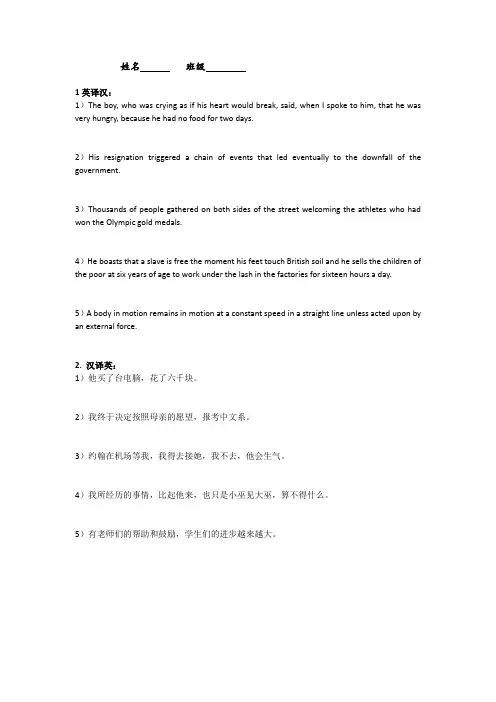
姓名班级1英译汉:1)The boy, who was crying as if his heart would break, said, when I spoke to him, that he was very hungry, because he had no food for two days.2)His resignation triggered a chain of events that led eventually to the downfall of the government.3)Thousands of people gathered on both sides of the street welcoming the athletes who had won the Olympic gold medals.4)He boasts that a slave is free the moment his feet touch British soil and he sells the children of the poor at six years of age to work under the lash in the factories for sixteen hours a day.5)A body in motion remains in motion at a constant speed in a straight line unless acted upon by an external force.2. 汉译英:1)他买了台电脑,花了六千块。
2)我终于决定按照母亲的愿望,报考中文系。
3)约翰在机场等我,我得去接她,我不去,他会生气。
4)我所经历的事情,比起他来,也只是小巫见大巫,算不得什么。
5)有老师们的帮助和鼓励,学生们的进步越来越大。

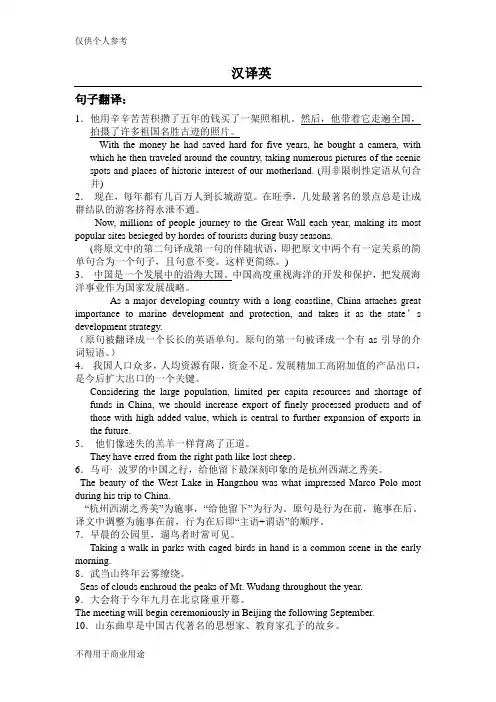
汉译英句子翻译:1.他用辛辛苦苦积攒了五年的钱买了一架照相机。
然后,他带着它走遍全国,拍摄了许多祖国名胜古迹的照片。
With the money he had saved hard for five years, he bought a camera, with which he then traveled around the country, taking numerous pictures of the scenic spots and places of historic interest of our motherland. (用非限制性定语从句合并)2.现在,每年都有几百万人到长城游览。
在旺季,几处最著名的景点总是让成群结队的游客挤得水泄不通。
Now, millions of people journey to the Great Wall each year, making its most popular sites besieged by hordes of tourists during busy seasons.(将原文中的第二句译成第一句的伴随状语,即把原文中两个有一定关系的简单句合为一个句子,且句意不变。
这样更简练。
)3.中国是一个发展中的沿海大国。
中国高度重视海洋的开发和保护,把发展海洋事业作为国家发展战略。
As a major developing country with a long coastline, China attaches great importance to marine development and protection, and takes it as the state’s development strategy.(原句被翻译成一个长长的英语单句。
原句的第一句被译成一个有as引导的介词短语。
)4.我国人口众多,人均资源有限,资金不足。
发展精加工高附加值的产品出口,是今后扩大出口的一个关键。

21世纪大学英语翻译Unit 1一、汉译英1)你知道约翰这次失败的原因吗?他在中学里几乎全优。
(lead to, failure, excel in)Do you know what has led to John’s failure this time? He excelled in almost everything in high school.2)不要把今天应该做的的事情推迟到明天。
如果你落后就很难赶上了。
(put off, what, fall behind, catch up)Don’t put off till tomorrow what you should do today. If you fall behind, it will be difficult for you to catch up.3) 他总是用新方法来解决问题,所以他在工作中取得了很大的成功。
(achieve, success, attack) He achieves great success in his work because he always finds new ways to attack problems.4)不要对这个孩子太严格。
你应该让他有些玩耍的时间来减轻压力。
(be hard on, allow, fun time, reduce, stress)Don’t be too hard on the child. You should allow him to have some fun time to reduce stress.5) 我们都期待史密斯教授给我们的大学学习一些有益的指导。
(expect, helpful tips)We all expect Prof. Smith to give us some helpful tips on college study.6) 贝蒂面带紧张的神色,好像害怕向别人做自我介绍似的。
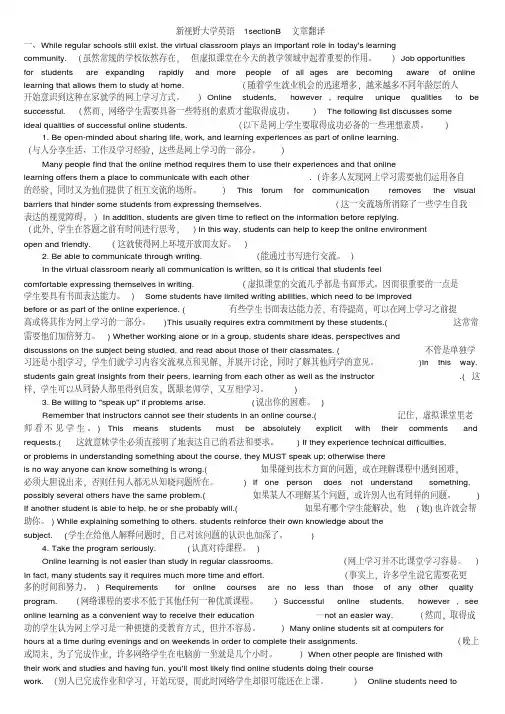
新视野大学英语1sectionB文章翻译一、While regular schools still exist, the virtual classroom plays an important role in today's learningcommunity.(虽然常规的学校依然存在,但虚拟课堂在今天的教学领域中起着重要的作用。
)Job opportunitiesfor students are expanding rapidly and more people of all ages are becoming aware of online learning that allows them to study at home. (随着学生就业机会的迅速增多,越来越多不同年龄层的人开始意识到这种在家就学的网上学习方式。
)Online students, however, require unique qualities to be successful.(然而,网络学生需要具备一些特别的素质才能取得成功。
)The following list discusses someideal qualities of successful online students. (以下是网上学生要取得成功必备的一些理想素质。
)1. Be open-minded about sharing life, work, and learning experiences as part of online learning.(与人分享生活、工作及学习经验,这些是网上学习的一部分。
)Many people find that the online method requires them to use their experiences and that onlinelearning offers them a place to communicate with each other.(许多人发现网上学习需要他们运用各自的经验,同时又为他们提供了相互交流的场所。
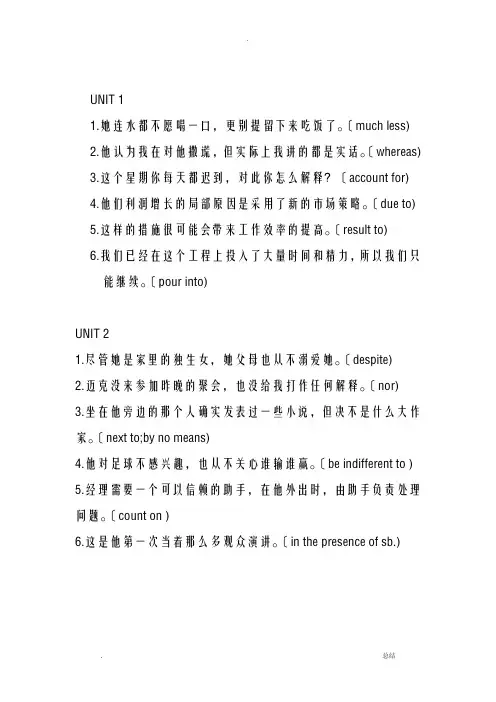
UNIT 11.她连水都不愿喝一口,更别提留下来吃饭了。
〔much less)2.他认为我在对他撒谎,但实际上我讲的都是实话。
〔whereas)3.这个星期你每天都迟到,对此你怎么解释?〔account for)4.他们利润增长的局部原因是采用了新的市场策略。
〔due to)5.这样的措施很可能会带来工作效率的提高。
〔result to)6.我们已经在这个工程上投入了大量时间和精力,所以我们只能继续。
〔pour into)UNIT 21.尽管她是家里的独生女,她父母也从不溺爱她。
〔despite)2.迈克没来参加昨晚的聚会,也没给我打作任何解释。
〔nor)3.坐在他旁边的那个人确实发表过一些小说,但决不是什么大作家。
〔next to;by no means)4.他对足球不感兴趣,也从不关心谁输谁赢。
〔be indifferent to )5.经理需要一个可以信赖的助手,在他外出时,由助手负责处理问题。
〔count on )6.这是他第一次当着那么多观众演讲。
〔in the presence of sb.)UNIT 31.你再怎么有经历,也得学习新技术。
〔never too...to...)2.还存在一个问题,那就是派谁去带着那里的研究工作。
〔use an appositional structure)3.由于文化的不同,他们的关系在开场确实遇到了一些困难。
〔meet with)4.虽然他历经浮沉,但我始终相信他总有一天会成功的。
〔ups and downs;all along)5.我对你的说法的真实性有些保存看法。
〔have reservations about)6.她长得并不特别高,但是她身材瘦,给人一种个子高的错觉。
〔give an illusion of )UNIT 41.有朋自远方来,不亦乐乎?〔use "it"as the formal subject)2.不管黑猫白猫,能抓住老鼠就是好猫。
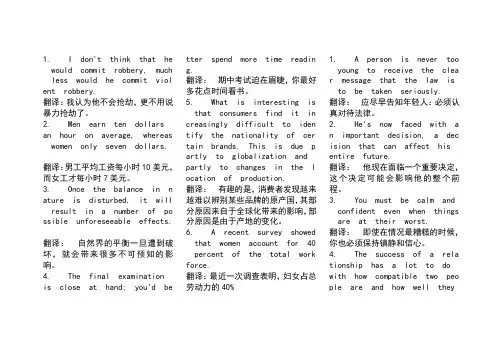
1. I don't think that he would commit robbery, much less would he commit viol ent robbery.翻译:我认为他不会抢劫,更不用说暴力抢劫了。
2. Men earn ten dollars an hour on average, whereas women only seven dollars.翻译:男工平均工资每小时10美元,而女工才每小时7美元。
3. Once the balance in n ature is disturbed, it will result in a number of po ssible unforeseeable effects.翻译:自然界的平衡一旦遭到破坏,就会带来很多不可预知的影响。
4. The final examinationis close at hand; you'd be tter spend more time reading.翻译:期中考试迫在眉睫,你最好多花点时间看书。
5. What is interesting isthat consumers find it increasingly difficult to identify the nationality of certain brands. This is due partly to globalization andpartly to changes in the location of production.翻译:有趣的是,消费者发现越来越难以辨别某些品牌的原产国,其部分原因来自于全球化带来的影响,部分原因是由于产地的变化。
6. A recent survey showedthat women account for 40percent of the total workforce.翻译:最近一次调查表明,妇女占总劳动力的40%1. A person is never tooyoung to receive the clear message that the law isto be taken seriously.翻译:应尽早告知年轻人:必须认真对待法律。
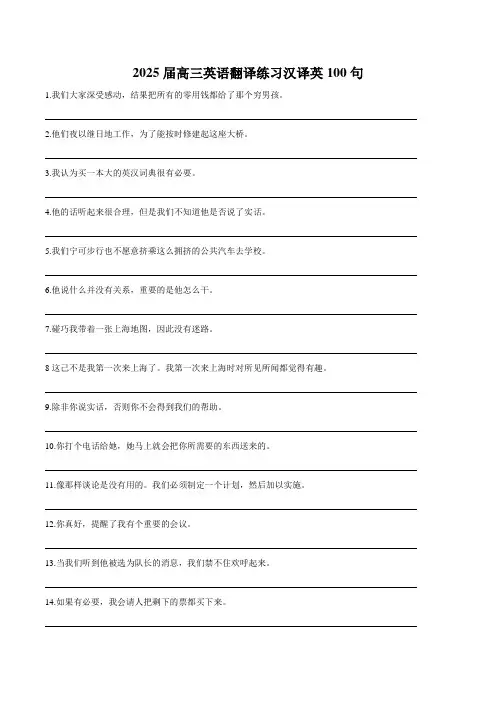
2025届高三英语翻译练习汉译英100句1.我们大家深受感动,结果把所有的零用钱都给了那个穷男孩。
2.他们夜以继日地工作,为了能按时修建起这座大桥。
3.我认为买一本大的英汉词典很有必要。
4.他的话听起来很合理,但是我们不知道他是否说了实话。
5.我们宁可步行也不愿意挤乘这么拥挤的公共汽车去学校。
6.他说什么并没有关系,重要的是他怎么干。
7.碰巧我带着一张上海地图,因此没有迷路。
8这己不是我第一次来上海了。
我第一次来上海时对所见所闻都觉得有趣。
9.除非你说实话,否则你不会得到我们的帮助。
10.你打个电话给她,她马上就会把你所需要的东西送来的。
11.像那样谈论是没有用的。
我们必须制定一个计划,然后加以实施。
12.你真好,提醒了我有个重要的会议。
13.当我们听到他被选为队长的消息,我们禁不住欢呼起来。
14.如果有必要,我会请人把剩下的票都买下来。
15.只要你让我管这个孩子,我就会让他用功。
16.任何不守规则的人都要受到惩罚。
17.他们一定挺忙的,因为他们必须准备考试。
18.你一定丢失了什么东西,不然不会看起来这么焦虑。
19.据报道,那个国家的军队正在攻击其邻国。
20.你真幸运,你的数学老师被认为是全校最好的老师。
21.直到所有的病人都得到了治疗,医生才离开他的办公室。
22.随着上海的发展,上海人民的生活条件已大为改善。
23.有老师们的帮助和鼓励,学生们的进步越来越大。
24.我从未看到过这么激动人心的足球赛,它比我想象的精彩得多。
25.只有当你理解领会了这种知识,才能把它记住。
26.他们来上海已经一个半月了,但至今还未找到工作。
27.过了一个月他才回家,结果他的叔父已经离开了。
28.请把书刊放回原处。
29.“有志者事竟成”这是一条常见的英语谚语。
30.我们除了等待进一步的消息外什么也干不了,尽管我们并不愿意那么做。
31.但愿我能给你一点帮助,但事实上我自己也只能依靠别人。
32.如果你坚持要我一个人去,我愿惹服从你的命令。
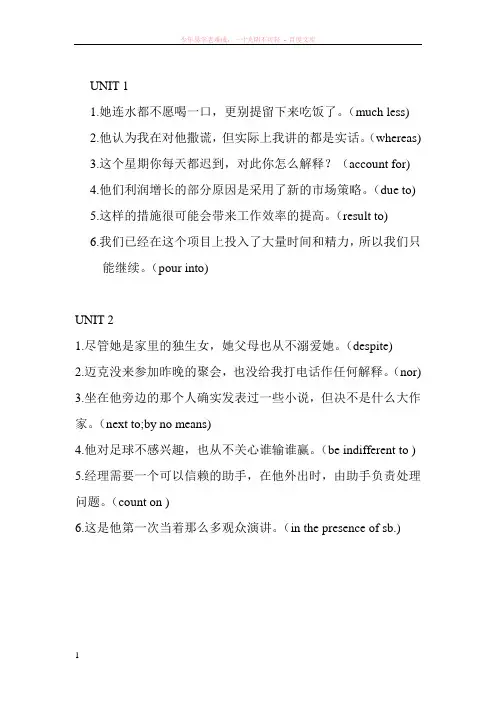
UNIT 11.她连水都不愿喝一口,更别提留下来吃饭了。
(much less)2.他认为我在对他撒谎,但实际上我讲的都是实话。
(whereas)3.这个星期你每天都迟到,对此你怎么解释?(account for)6.这是他第一次当着那么多观众演讲。
(in the presence of sb.)1.你再怎么有经验,也得学习新技术。
(never too...to...)2.还存在一个问题,那就是派谁去带领那里的研究工作。
(use an appositional structure)3.由于文化的不同,他们的关系在开始确实遇到了一些困难。
than+ adjective)5.人人都知道他比较特殊:他来去随意。
(be free to do sth.)6.看她脸上不悦的神色,我觉得她似乎有什么话想跟我说。
(free as though)1.他说话很自信,给我留下了很深的印象。
(use "which"to refer back to an idea or situation)2.我父亲太爱忘事,总是在找钥匙。
(use"so...that..."to emphasize the degree of something)(ill at ease)6.当地政府负责运动会的安全。
(take charge of )UNIT 11.She wouldn't take a drink,much less could she stay for dinner.2.He thought I was lying to him,whereas I was telling the truth.3.How do you account for the fact that you have been late every day this week?4.The increase in their profits is due partly to their new marketno means a great writer.4.He has no interest in football and is indifferent to who wins to loses.5.The manager needs an assistant that he can count on to take care of problems in his absence.6.This is the first time that he has made a speech in the presence of so large an audience.UNIT 31.You are never too experienced to learn new techniques.1.It is a great pleasure to meet friends from a far.2.It doesn't matter whether the cat is black or white as long as it catches mice.3.You must let me have the money back without fail by ten o'clock tomorrow morning.4.Allow me to take part in this project:I am more than a little interested in it.5.Everyone knows that he is special:He is free to come and go as he pleases.6.Watching the unhappy look on her face,I felt as though she wishesUNIT 61.(Just) as a machine needs regular running,so does the body need regular exercise.2.He learned to play the piano while studying in the United States.3.To our disappointment,he turned down out invitation.4.The reality is that,for better or worse,the world has changed with advance of new technologies.5.Most of the female students in my class appear to be ill at ease when (they are) required to answer questions.6.The local government took charge of the security for the sports。
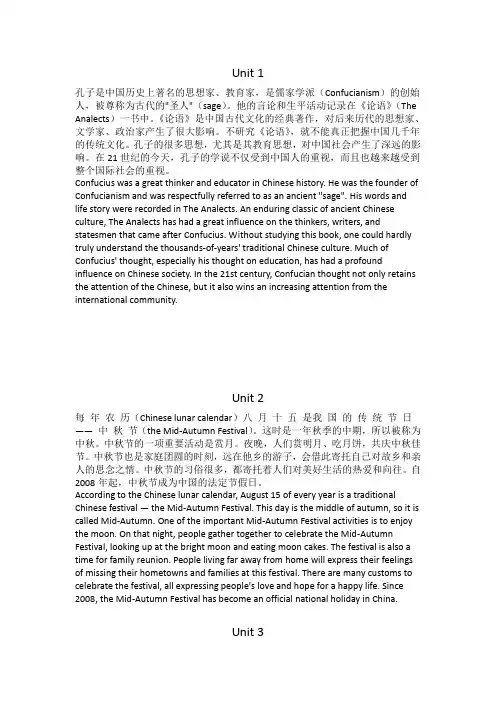
Unit 1孔子是中国历史上著名的思想家、教育家,是儒家学派(Confucianism)的创始人,被尊称为古代的"圣人"(sage)。
他的言论和生平活动记录在《论语》(The Analects)一书中。
《论语》是中国古代文化的经典著作,对后来历代的思想家、文学家、政治家产生了很大影响。
不研究《论语》,就不能真正把握中国几千年的传统文化。
孔子的很多思想,尤其是其教育思想,对中国社会产生了深远的影响。
在21世纪的今天,孔子的学说不仅受到中国人的重视,而且也越来越受到整个国际社会的重视。
Confucius was a great thinker and educator in Chinese history. He was the founder of Confucianism and was respectfully referred to as an ancient "sage". His words and life story were recorded in The Analects. An enduring classic of ancient Chinese culture, The Analects has had a great influence on the thinkers, writers, and statesmen that came after Confucius. Without studying this book, one could hardly truly understand the thousands-of-years' traditional Chinese culture. Much of Confucius' thought, especially his thought on education, has had a profound influence on Chinese society. In the 21st century, Confucian thought not only retains the attention of the Chinese, but it also wins an increasing attention from the international community.Unit 2每年农历(Chinese lunar calendar)八月十五是我国的传统节日——中秋节(the Mid-Autumn Festival)。
U11)我不曾想到,随着时间的流逝,我果真以身为社工而自豪(count on;take pride in)英译汉What I didn’t count on was that over time I would sincerely take pride in being a social worker.4)昏暗的路灯下站着一个哭泣的小女孩。
(dim;weep)汉译英In the dim street light stood a weeping little girl.5)从上个月起,我的工作就是围绕日常办公事务转,所以现在每天掰着指头算什么时候才到国庆节:我和朋友要去乡下远足呢!(revolve;count the days)英译汉Since last month ,my work has been revolving around the routine office duties,so now I am counting the days until the National Day comes,when my friends and I are going hiking in the countryside.U21)无论是友情还是爱情,你都不可能期待自己付出最少而得到最多。
(maximum;minimum)英译汉In either friendship or love, you should never expect to receive the maximum while you give the minimum.2)我把全部希望寄托在他的承诺上,结果却发现他根本不是个真诚的人。
(build on;sincerity)英译汉I built all my hopes on his promises, only to find that he was not a man of sincerity at all.3)我们带母亲去了所有我们能找到的最好的医院,但一切努力都是徒劳的,母亲还是没能熬过那次疾病。
汉英互译1.房子着火了,里面的人面临着死亡的危险。
(in danger of)The house was on fire and the people inside were in danger of losing their lives.2.他买不起这么好的房子。
(afford to do)He cannot afford to buy such a nice house.3. 这个主意听起来也许有些怪,不过还真有点道理。
(make sense)Although this idea may sound strange, it does make sense.4. 约翰看起来是个好人。
即便如此,我还是不信任他。
(even so)John seems (to be) a nice person. Even so, I don’t trust him.英汉互译1. Even though the first McDonald’s restaurant sold only hamburgers and French fries, it still became a cultural symbol.虽说第一家麦当劳餐馆只售汉堡包和薯条,它还是成为了一种文化象征。
2. These people are angry that the building is now in danger of being destroyed, along with their memories.这些人想到餐馆连同他们的美好回忆一起将被摧毁,感到很气愤。
3. They are using the earthquake as an excuse.他们在利用那次地震作借口。
4. Some think that McDonald’s real reason for wanting to close down the restaurant has nothing to do with money.有人认为麦当劳想关闭这家餐馆的真正原因与金钱无关。
2021英语四级翻译答案2021年6月英语四级翻译一经出炉就在网上炸开了锅,不难看出依旧考查的是中国传统文化的相关话题,所以考生应在平时多注意积累相关话题词,今天小编给大家整理了2021英语四级翻译答案,我们一起来看看吧!2021年6月英语四级翻译真题答案-第一套Part Ⅳ Translation 翻译(汉译英)铁观音(Tieguanyin) 是中国最受欢迎的茶之一,原产自福建省安溪县西坪镇,如今安溪全县普遍种植,但该县不同地区生产的铁观音又各具风味。
铁观音一年四季均可采摘,尤以春秋两季采摘的茶叶品质最佳。
铁观音加工非常复杂,需要专门的技术和丰富的经验。
铁观音含有多种维生素,喝起来口感独特。
常饮铁观音有助于预防心脏病、降低血压、增强记忆力。
Tieguanyin is one of the most popular types of tea in China with its origin inXipingTown,AnxiCounty,Fujian Province .Although widely planted in AnxiCounty,the tea produced in different parts tastes very differently .Tieguanyin can be picked all the year around with the best in spring and autumn .The tea involves very complex process ,whic hneeds professional skills and sophisticated experiences .As it contains many vitamins and possesses a unique flavour , the tea helps prevent heart diseases ,lower blood pressure and improve memory if one drinks it regularly .2021年6月英语四级翻译真题答案-第二套Part Ⅳ Translation 翻译(汉译英)龙井(Longing)是一种绿茶,主要产自中国东部沿海的浙江省。
2015年汉译英综合练习1. 她就是这样风里来,雨里去,成年累月地工作着。
This is how she carries on her work, rain or shine, all the year round.2.西湖如明镜,千峰凝翠,洞壑幽深,风光奇丽。
The West Lake is like a mirror, embellished all around with emerald hills and deep caves of enchanting beauty.3.但我就是这个脾气,虽然几经努力,却未能改变过来。
But it’s the way I am, and try as I might, I haven’t been able to change it.4.一踏上中华人民共和国国土,我们就随时随地地受到关怀和照顾。
From the moment we stepped into the People’s Republic of China, care and kindness surrounded us on every side.5.袭人道:“一百年还记得呢!比不得你,拿着我的话当耳边风,夜里说了,早起就忘了。
”“I’ll remember it if I live to be a hundred!” said Aroma. “I am not like you, letting what I say go in at one ear and out at the other forgetting what’s said at night by the next morning.”6.要制造飞机,就必须仔细考虑空气阻力问题。
Air resistance must be given careful consideration when the aircraft is to be made.7.为什么总把这些麻烦事推给我呢?Why should all the unpleasant jobs be pushed onto me?8.只有在我过于劳累,在我长时间无间断地工作,在我感到内心空虚,需要补充精神营养的时候,我才感到寂寞。
C1Science is a kind of knowledge which is a very useful tool in solving the technical problem of industry, agriculture, warfare and medicine. To understand the width and depth to which science can be applied to the material and spiritual problems that confront the individuals and nations requires an understanding of what science really is.The word science comes to us from a Latin word, scire, which means “to know”. Then, in a broad sense, science is simply what we know; the total of all human knowledge. But the definition of science as all human knowledge would not be a workable one,for it is obvious that there are different types of types of knowledge. The kinds differ according to how the knowledge was obtained,and also according to what frame of experience it fits. What we know of the arts,literature, law, religion,and technical knowhow, are more or less separate funds of information. They have little to do with what we commonly call science.Science is also called natural science to distinguish it from other branches of learning. Science is concerned with nature,that is,with knowledge of the characteristics and operations of any and all natural things and happenings. Science embraces all of nature, and expresses our best ideas of how natural phenomena are related to each other and are to be formed into what is called the universe.Science has many characteristics,and to understand what science is requires a detailed examination of these properties and peculiarities. A number of writers have asserted that science is really only a method——the scientific method. Such a definition is an oversimplification, but it is certain that the scientific method plays an important role in determining the nature of scientific knowledge.C3Lots of people pretend that they never read advertisements, but this claim is hardly believable. It is almost impassible not to read advertisements these days. Just think what fun they often provide! Imagine what a bus and railway station would be like without advertisements? Would you enjoy gazing helplessly at a blank wall while waiting for a bus or train? Would you like to read a daily paper closely-printed with columns of news? A cheerful,witty advertisement makes such a difference to a drab wall or newspaper. We must not forget,either,that advertising makes a positive contribution to our packets. Newspapers, radio or television stations could not subsist without this source of revenue. The fact that we pay so little for our daily paper,or can enjoy so many programs on air is due entirely to the money spent by advertisers. Just think what a newspaper would cost if we had to pay its full price! Another thing we mustn't forget is the "small ads" which are in virtually every newspaper. What a tremendously useful service they perform for the community! Just about everything can be accomplished through these columns,for instance,you can find a job,buy or sell a house,announce a birth,marriage or death. It's the advertisement among the advertisements.C4Few great names in music spell as much magic to the average concert-goer as that of Tschaikovsky. In almost every musical form will be found a work of his ranking high in popularity. And quite deservedly so. Tschaikovsky's music is filled with a warm humanity and stirring drama. The themes and feelings are easy to grasp. The personal,intimate note is so strong in this music that we find it natural,while listening to the Pathetic Symphony or the Nutcracker Ballet Suite,for example,to share Tschaikovsky's joys and sorrows. His music seems to take us into hisconfidence and show us the secret places of his heart. Although Tschaikovsky's range of moods is wide——from the whimsical play of light fantasy to stormy outcries of anguish——essentially he was a melancholy man,in his music as in his life. Perhaps it is the genuineness ofhis music in conveying strong emotions arid suffering that has drawn millions to his symphonies and concertos. A frank sincerity and warm-heartedness flow from his music. The best of his melodies linger hauntingly in the mind and heart. As long as sincere feeling expressed in sincere artistic form can move the hearts of men, Tschaikavsky's music will continue to hold a high place in the concert hall and opera house.Only Beethoven and Mozart can rival Tschaikovsky in the number of compositions in various musical forms that stands out as repertory favorites. Tschaikovsky's violin concerto is as much a "request” item as Beethoven's. The Pathetic Symphony ranks with the three or four enduring favorites of the repertory. Tschaikovsky's Nutcracker ballet is probably the most popular suite of its kind in music.C6Emphasis on "practicalities" is being characterized by the subordination of the social sciences to the natural sciences. History is seen not as essential experience to be transmitted to new generations, but as abstractions that carry stale odors. Art is regarded as something that calls far indulgence or patronage and that has no place among the practical realities. Political science is viewed more as a specialized subject for people who want to go into politics than as an opportunity for citizens to develop a knowledgeable relationship with the systems by which human societies are governed. Finally,literature and philosophy are assigned the role of intellectual adornments that have nothing to do with "genuine" education.Nothing is more valuable for anyone who has had a professional or vocational education than to be able to deal with abstractions or complexities, or to feel comfortable with subtleties of thought or language,or to think logically. The doctor why knows only disease is at a disadvantage compared with the doctor who knows at least as much about people as he does about pathological organisms. For the technologist,the engineering of co-operation can be just as important as the engineering of moving parts.The social sciences would be expendable only if the human past never existed or had nothing to tell us about the present; if thought processes were irrelevant to the achievement of purpose; if creativity was beyond the human mind and had nothing to do with the joy of living; if human relationships were random aspects of life; if human beings never had to cope with panic or pain, or if they never had to anticipate the connection between cause and effect; if all the mysteries of mind and nature were fully probed.C7We live in a materialistic society and are nurtured from our earliest years to be acquisitive. Our possessions——"mine" and "yours"——are clearly labeled from early childhood. When we grow old enough to earn a living, it does not surprise us to discover that success is measured in terms of the money you earn. However, it is not only in affluent societies that people are obsessed with the idea of making more money. Consumer goods are desirable everywhere and modern industry deliberately sets out to create new markets.Gone are the days when industrial goods were made to last forever. The wheels of the industry must be kept turning. Built-in obsolescence provides the means: goods are made to be discarded. You no sooner acquire this year's model than you are thinking about its replacement.This materialistic outlook has seriously influenced education. Fewer and fewer young people these days acquire knowledge only for its own sake. Every course of studies must lead somewhere,for example,to a bigger wage packet. The demand far hi-tech personnel far exceeds the supply and big companies compete with each other to recruit students before they have completed their studies. Tempting salaries and "fringe benefits" are offered to them. Recruiting tactics of this kind have led to the "brain drain",the phenomena in which highly skilled people offer their service to the highest bidder. The wealthier nations deprive their poorer neighbors of their most able citizens. While Mammon is worshipped as never before,the rich get richer and the poor, poorer.B2Nowadays in the city's tonier residential districts there are people named as the singles, who are usually young, rich and tech-savvy professionals and choose independently their own lifestyles. The number of singles has increased dramatically over the recent years. The reasons of remaining single are various: some may be busy exploring careers without putting their marriage into the agenda, some may indulge in their jobs, travel, entertainment, physical fitness or friendship. More than 80% of them have not abandoned the value of marriage, and they say they aspire to marry or they want to be married someday,but they are patient and feel content being single until they meet the right person.B6The cooperation between China and the West is of mutual benefit. The economic development of China not only improves the life of Chinese people,but also gives a new impetus to the world economy and offers more opportunities far the developed countries in business. China and the West can complement each other quite well on the grounds that China is a potentially great market and the West has advanced technology and abundant funds. With China entering WTO soon,China will greatly increase communication, whether in economy or in culture,with the countries all over the world. Economic globalization will usher in a bright future far China.B7Clinton and Bush are different greatly from each other. Clinton attends in person to everything, trivial or critical; he and his advisors never fail to take part in the interminable meeting of politics or economy; he can memorizes data well just like a computer. On the contrary,Bush dislikes a meeting that lasts over 15 minutes,and even loathes being bothered by confusing figures. Clinton has cared very much about public approval presented by polls since his early presidency,where Bush, in a sharp contrast, proclaimed at the outset of his election that he would make all decisions on his own.Clinton is an avid reader,but his successor is not. Joyful,casual and elegant,theex-president time and again drinks a little, but the new president has been a teetotal since he abstained from it 14 years ago.Bush Jr. was born of a privileged W ASP family in Texas, while the former,from an ordinary family,has tempered himself and developed his talents in hardships. He works with his wisdom and eloquence,which his successor is short of.注:B3、B10、B13在PDF上没有找到,希望有人补上,B5没有汉译英。